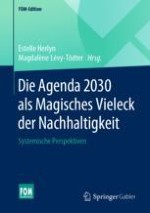2020 | OriginalPaper | Chapter
4. Eine chinesische Nachhaltigkeitsagenda: Wirtschaftliche Entwicklungen als Treiber für eine grüne Zukunft?
Authors : Nick Lin-Hi, Igor Blumberg
Published in: Die Agenda 2030 als Magisches Vieleck der Nachhaltigkeit
Publisher: Springer Fachmedien Wiesbaden
Activate our intelligent search to find suitable subject content or patents.
Select sections of text to find matching patents with Artificial Intelligence. powered by
Select sections of text to find additional relevant content using AI-assisted search. powered by
